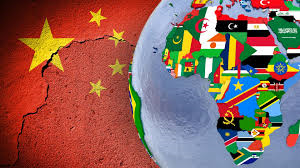Balancing the benefits of Chinese infrastructure projects with the risks of unsustainable debt is a critical issue for many African countries. Here's how they can achieve this balance:
1. Diversifying Funding Sources
African countries can mitigate the risks of debt dependency on China by diversifying their sources of external finance. This involves seeking partnerships and investments from multiple nations, development banks, and private investors. By tapping into a wider range of financing options, governments can reduce over-reliance on Chinese loans.
2. Strengthening Negotiation Capacity
Many African countries may lack the necessary expertise to negotiate favorable terms in infrastructure deals. Building capacity in international finance and contract negotiation would enable them to secure better loan conditions, such as lower interest rates or longer repayment periods. Training negotiators and employing international advisors can enhance the ability to assess risks and benefits.
3. Prioritizing Sustainable Projects
Not all infrastructure projects generate enough economic return to justify the debt incurred. African countries should prioritize projects with clear potential to drive long-term economic growth, such as transport hubs, energy, and telecommunications infrastructure. Proper feasibility studies and cost-benefit analyses can help governments choose projects that will have the greatest impact on development without overburdening public finances.
AfriPrime App link: FREE to download...
https://www.amazon.com/Africircle-AfriPrime/dp/B0D2M3F2JT
4. Ensuring Transparency and Accountability
Debt sustainability risks are heightened when there is a lack of transparency in the contracting and loan processes. African governments can ensure that infrastructure deals with China are made transparent by disclosing the terms of contracts, expected repayments, and associated risks. Independent audits and oversight mechanisms would help ensure that these projects align with national priorities and that debt levels remain manageable.
5. Improving Debt Management Systems
Robust debt management is key to preventing the accumulation of unsustainable obligations. African countries should strengthen their debt monitoring systems to track loan commitments, disbursements, and repayments. This can be supported by improving national debt offices, ensuring accurate data collection, and implementing early-warning systems to signal potential risks of default or excessive borrowing.
6. Negotiating Debt Restructuring and Relief
In cases where debt becomes unsustainable, African countries can explore debt restructuring or relief mechanisms. This may include refinancing existing loans, negotiating debt-for-equity swaps, or seeking debt forgiveness under international initiatives. Early and proactive engagement with lenders like China is crucial to avoid reaching critical levels of indebtedness.
7. Fostering Regional Cooperation
African countries can also work together regionally to negotiate collective infrastructure projects, sharing the benefits and reducing individual debt burdens. Regional infrastructure programs, such as those facilitated by the African Union or regional economic communities, can help lower costs and increase bargaining power when dealing with large investors like China.
By adopting these strategies, African countries can leverage Chinese infrastructure investments while minimizing the risk of falling into debt traps that could threaten their long-term economic stability.
AfriPrime App link: FREE to download...


